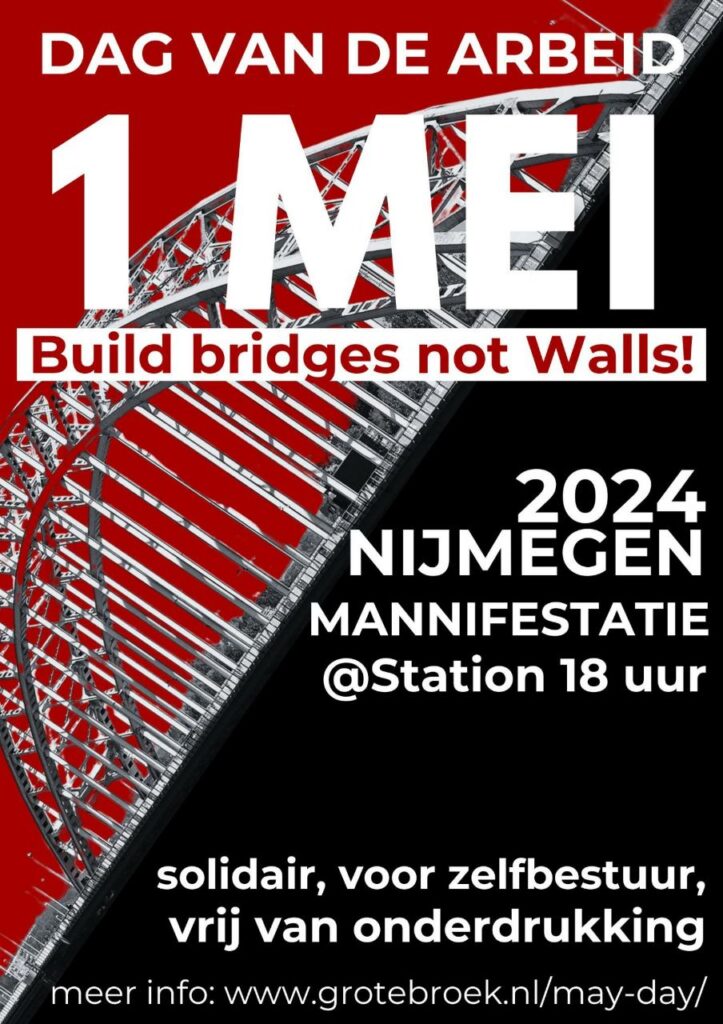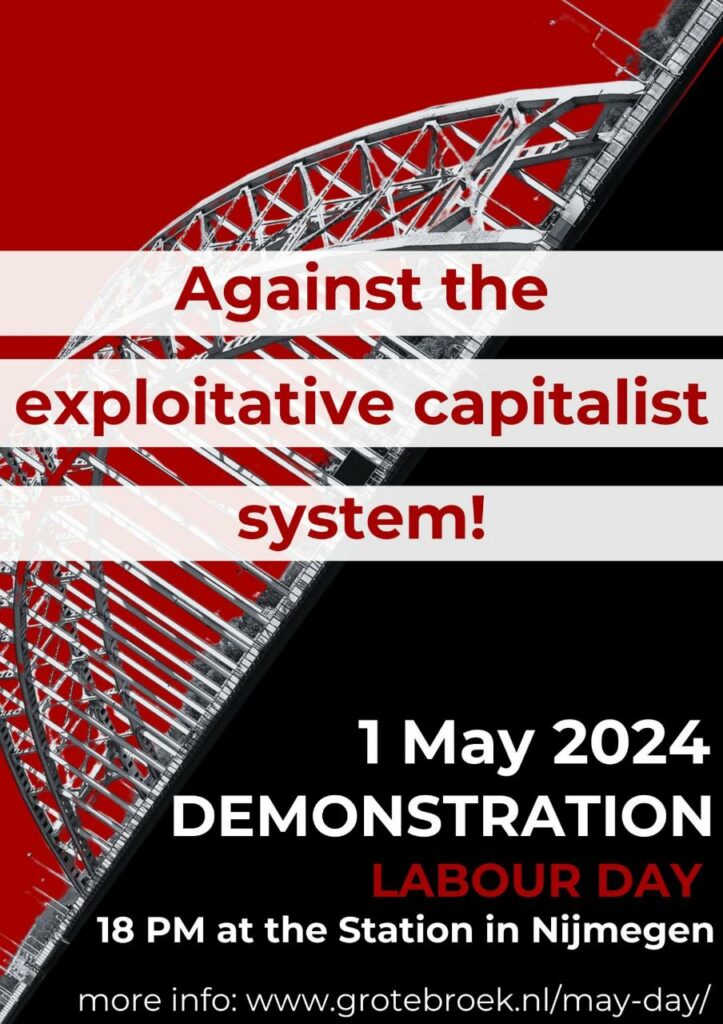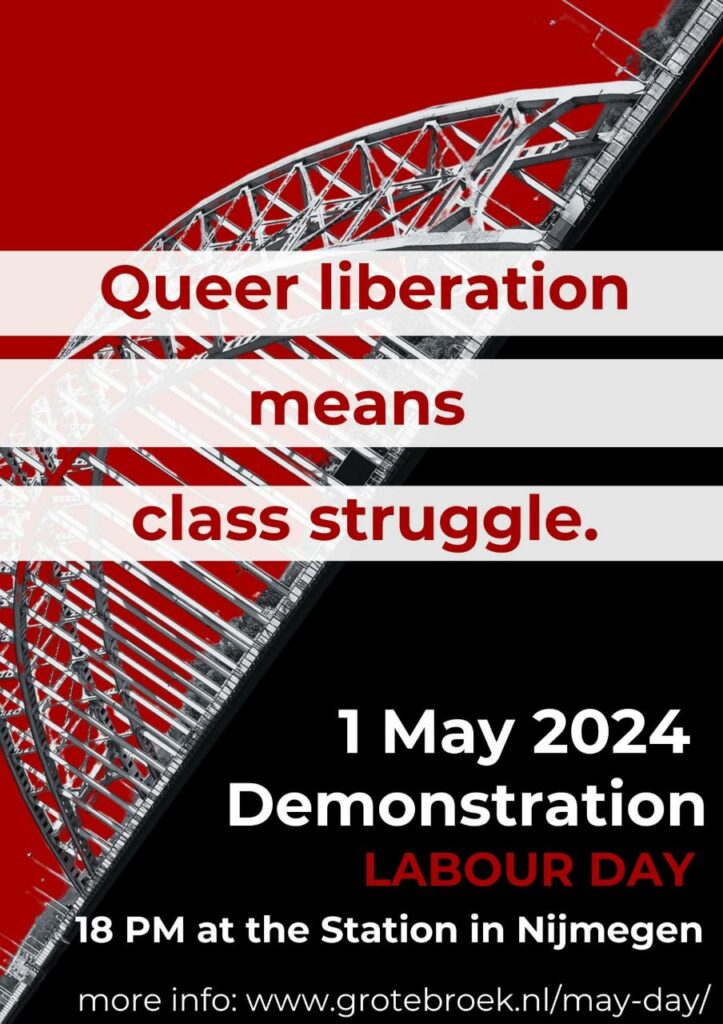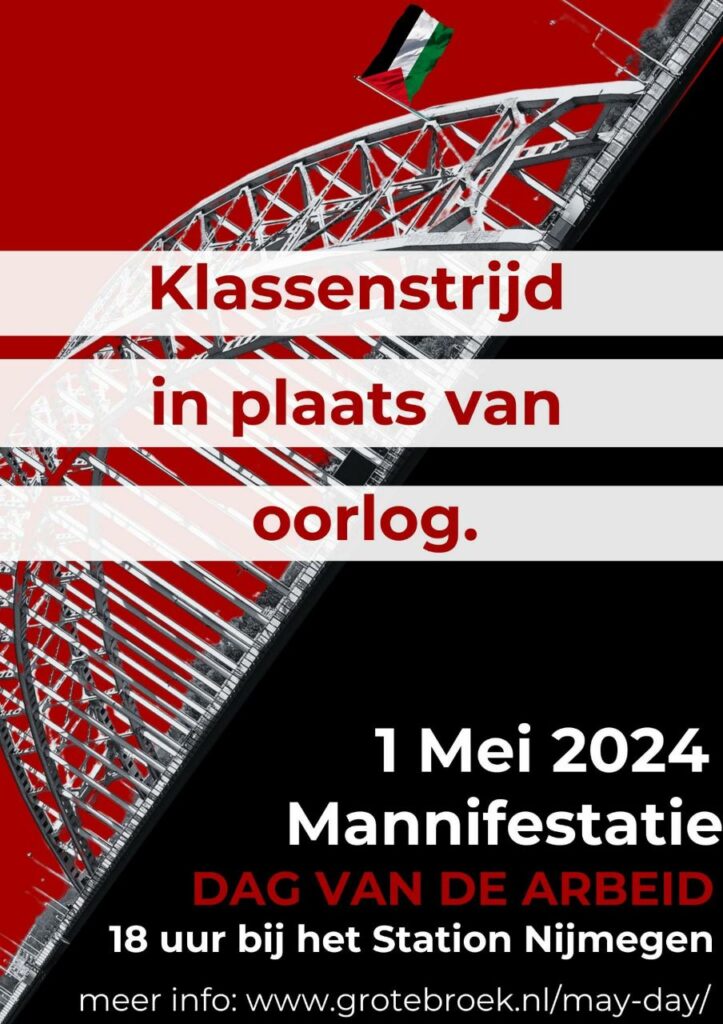May Day march on the 1st of May 2024 ( Dutch Follows English )

May 1st 2024-Labour Day Demonstration in Nijmegen – Build bridges, not walls! Start: 18:00 Train Central Station Nijmegen
Since the strike on 1 May 1886 by thousands of workers in Chicago and the following sentencing of 8 anarchists to death, 1 May has been considered a day of struggle for workers worldwide.
In 2024 to work in a capitalistic society still means that workers are oppressed and exploited to maximise profits. That’s why we call out for a demonstration on Mayday 2024 in Nijmegen where we want to stand together in the fight for a world of solidarity where the needs of the people outweigh the profits of the few.
We want to make clear that Labour Day, is not only a day to celebrate the workers-movement but especially a day of struggle in Solidarity with marginalized People and Communities. That’s why we invite you to join us on the streets. Next to a march through the city, there will be speeches about the historical background of Mayday, queer feminist perspectives, and voices of migrant workers. Meeting at Nijmegen CS, May 1st, 18:00, duration ca. 2 hours, the route is accessible with a wheelchair, Dinner is 3-6 euros
More information about speakers and accessibility will follow soon
If you have questions about accessibility or want to participate please email us at:
may-day-nijmegen@proton.me
1 Mei 2024-Dag van de arbeid demonstratie in Nijmegen – Bouw bruggen in plaats van muren! Start: 18:00 Nijmegen Centraal Station
Sinds de staking op 1 mei 1886 door duizenden arbeiders in Chicago en de daarop volgende doodstraf van acht anarchisten, wordt 1 mei beschouwd als een dag van strijd voor arbeiders wereldwijd.
In 2024 betekent werken in de kapitalistische samenleving nog steeds dat werknemers worden onderdrukt en uitgebuit om winsten van anderen te maximaliseren. Daarom roepen we op tot een demonstratie op 1 mei 2024 in Nijmegen waar we samen willen strijden voor een solidaire wereld waarin de behoeften van de mensen zwaarder wegen dan de winsten van de weinigen.
We willen duidelijk maken dat de Dag van de Arbeid niet alleen een dag is om de arbeidersbeweging te vieren, maar vooral een dag van strijd in solidariteit met gemarginaliseerde mensen en gemeenschappen. Daarom nodigen we je uit om met ons de straat op te gaan. Naast een mars door de stad zullen er toespraken zijn over de historische achtergrond van 1 mei, queer feministische perspectieven en arbeiders met migratieachtergrond. Bijeenkomst in Nijmegen CS, 1 mei, 18:00, duur ca. 2 uur, route is toegankelijk met rolstoel, Diner is 3-6 euro
Meer informatie over sprekers + toegankelijkheid volgt snel.
Als je vragen hebt over toegankelijkheid of participatie, email ons graag:
may-day-nijmegen@proton.me
Themas/Themes
Geschiedenis van dag van de Arbeid / History of Labour Day
A brief history of May Day
On the 1st of May, we celebrate International Worker’s Day or “May Day”, commemorating the historic struggles, hardships, and achievements of workers around the world. Most notably, May 1st is used to commemorate the establishment of the eight-hour workday. The demand for an eight-hour workday had been on the agenda as early as the 17th century but became a particularly pertinent issue after the Industrial Revolution and the accompanying mass exploitation of workers.
The desire for a lessening of the inhumane workload was a cry heard over the entire globe and was agitated in various countries. For instance in Australia, where in 1856, Melbourne stonemasons participated in an organized strike, marching from the University to the Parliament House with flags scraping the sky, carrying the words: “Eight Hours for work. Eight hours for rest. Eight hours for what we will.” Their strike was a success, resulting in the right to an eight-hour workday for the Melbourne Stonemasons.
Eight hours to work,
Eight hours to play,
Eight hours to sleep,
Eight bob a day.
A fair day’s work,
For a fair day’s pay.
19th-century workers’ song
Even though the “Eight-hour Movement” was an international one, the specific appeal to fair working conditions that inspired the creation of May Day was in Chicago, Illinois, in the United States. On May 1st 1886, after years of struggle for an easing of working hours (which averaged to 60 hours a week), more than 300,000 workers from over 13,000 businesses across the United States participated in a strike to agitate for fairer working hours. In a sense, the very first May Day in history had begun.
Chicago was the epicentre of the strike, where over 40.000 strikers lay down their work. The strike went on for days and was organized, coordinated, and peaceful. However, the 3rd of May ended in tragedy. When the end of the working day was announced, a few strikers sought to confront some strike-breakers. The Chicago police’s response to the increasing unrest was violent and charged with gunpowder: two workers died, and various workers were wounded.
Indignant by the police’s violent actions, notable labour leaders urged for a public protest meeting the very next day at Haymarket Square. The meeting was a peaceful one – as observed by the Mayor of Chicago – but tensions grew as the police started to disperse the crowd. A bomb was thrown by an unknown perpetrator and again police forces retorted with gunpowder. Up to sixteen people died from gunshots, eight of these were policemen themselves, who shot at each other in the ensuing chaos. Only one police causality was attributed to the exploding bomb. This incident came to be known as the Haymarket Affair. Various anarchist labour leaders were arrested, tried, and some were hung. The judicial proceedings were – both today and shortly after they happened – condemned as a gross travesty of justice.
Towards the end of the 19th century, worker’s organizations around the world – among them the Second International – adopted May 1st as a day to commemorate the Haymarket Affair. Ever since, May Day has been dedicated to a celebration of workers’ achievements and a remembrance of labour struggle around the world, with the majority of countries marking it as an official holiday and celebrating it in various ways. To this day, however, The Netherlands does not have any public holiday dedicated to International Workers’ Day, making it one of the few countries not doing so.

Queer Feministisch perspectief van dag van de Arbeid / Queer Feminist perspective on Labour Day
Every labour struggle is also a queer-feminist struggle!
May 1st is the day of labour, not just paid wage labour. It is the day of struggle not only for certain workers, but for all wage-dependent, working-class, and marginalized people. So it is also our day as proletarian lesbians, women, inter, trans, non-binary, and agender people. Therefore the issues that affect us must be front and centre of the class struggle. So, on Labour Day we must talk about issues such as social reproduction, queer liberation, and structural gender oppression, and recognise the intersectional nature of this fight.
We as women, queer, trans and non-binary people also face worse pay, working conditions, and exploitation in the workplace. The majority of emotional and unpaid labour in the home which is vital to the functioning of our society is feminised, and often remains unrecognized.
We are ostracised from certain jobs and forced into others, where we are also exploited and taken advantage of. Our exploitation knows no boundaries, from the workplace to the home, the heteronormative, patriarchal, and capitalist structure of society oppresses us and needs to be destroyed.
We want an equal distribution and recognition of care work!
We want an end to violence and harassment against queers and women in and outside the workplace!
We want equal pay for equal work!
We want to dismantle racist, gender, and class structures!

Antiracisme en Arbeidsrechten van Migranten / Antiracism and Rights of Migrant Workers
Racism in Capitalism
Racism is the core foundation of capitalism. Since the rise of capitalism, the labour forces most
exploited have been workers of colour, especially in colonized areas. After the Second World War, the Netherlands, needing to rebuild not only the economy, but the entire country, attracted thousands of
people from its former colonies and other exploited countries. But, this was not an equal transaction.
There was very quickly a visible divide between Dutch workers and migrant workers, from worse
housing and lower wages to nonexistent worker protections. This was not a temporary trend,
because even now the worst jobs are still done by foreign labour exploited by Dutch companies.
Our food is being made in greenhouses worked by foreign labour, our packages are being handled in giant warehouses by foreign labour, and the worst cleaning jobs are being performed by foreign labour, all to keep this country running. And time and time again, labour laws are broken. Countless workers who have come to this country have had their passports taken away, they have been underpaid, and they have been illegally fired, all to ensure that the richest 1% are able to buy thousands of homes, buy unnecessary yachts, and live in comfort unknown to the suffering around the world.
But capital uses racist rhetoric to pit workers against each other. It works so well that a large
percentage of Dutch people voted for an overtly racist party. We must see and acknowledge that the
most exploited workers in the Netherlands are workers of colour, workers with non-Dutch names,
and especially workers without papers.
On labour day, in Nijmegen, we stand with these workers in solidarity.
